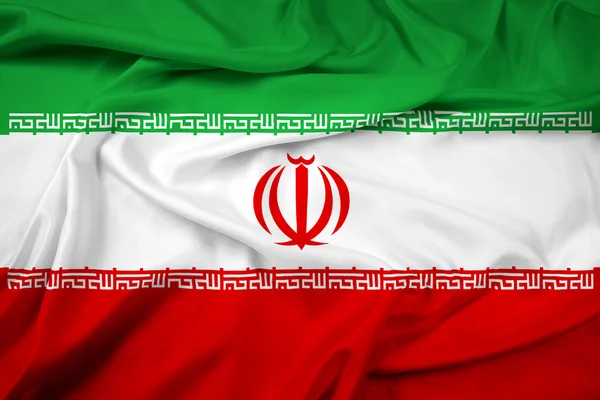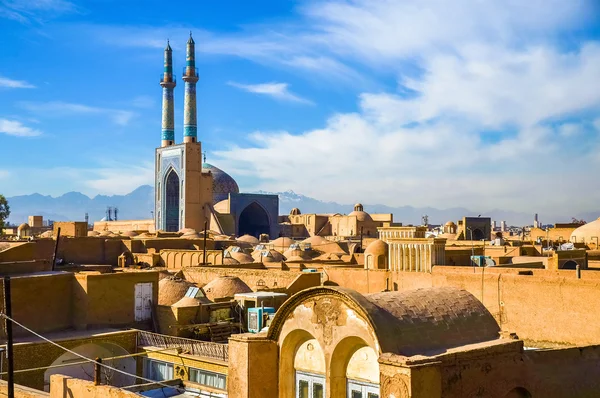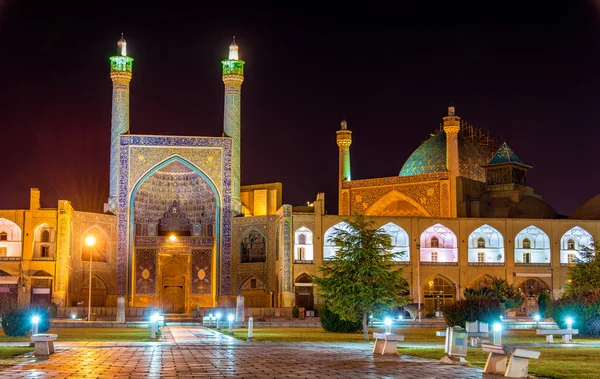For travelers seeking an extraordinary blend of ancient history, stunning architecture, and warm hospitality, the question often arises: “Is Iran Safe To Visit?”
The enigmatic allure of this Middle Eastern gem, punctuated by its rich cultural heritage, beckons adventurers from around the world.
Despite media portrayals and political tensions, Iran, in reality, offers a remarkable and secure experience for those who tread its diverse landscapes.
In this exploration of safety in Iran, we delve into the nuances and considerations that define this captivating destination. So, is Iran safe to visit?
Let’s embark on a journey to uncover the truth behind the headlines and discover the safety measures that pave the way for an unforgettable experience.

Is Iran Safe To Visit
Iran is generally safe for travelers, but like any destination, it has its unique considerations. While the country may not be entirely free of risks, most visitors have a safe and enriching experience.
It’s essential to stay informed, respect local customs, and follow travel advisories to ensure a trouble-free trip to this culturally rich and historically significant nation.
Understanding the Safety Landscape
Iran, a country known for its ancient history, stunning architecture, and warm hospitality, has often been misunderstood due to political tensions and media portrayal.
However, in reality, Iran is considered safe for tourists. The crime rate is relatively low, and violent crime against travelers is rare. Petty theft can occur, so it’s wise to take precautions like keeping your belongings secure and being vigilant in crowded areas.
Cultural Considerations
Iran is a predominantly Muslim country with strong cultural traditions. It’s important to respect local customs and dress modestly, especially for women who should wear a headscarf in public.
Public displays of affection are frowned upon, and alcohol is prohibited. Following these cultural norms is not only respectful but also contributes to a smoother and safer experience.
Regional Differences
While most of Iran is safe for tourists, some border regions and remote areas may have security concerns. It’s advisable to check with local authorities and travel advisories before venturing into these areas.
Additionally, political tensions can change the situation, so staying updated on current events is crucial.
Health and Travel Preparations
Iran has a relatively good healthcare system, but it’s essential to have travel insurance that covers medical emergencies. Be cautious about the local water supply, and stick to bottled water to avoid health issues.
Familiarize yourself with the visa requirements and have the necessary documents to avoid any complications at the border.

Is Iran Safe To Visit At Night?
Visiting Iran at night can be safe in many areas, but like any destination, it’s essential to exercise caution and be aware of your surroundings. Iran’s cities, including Tehran, have active nightlife scenes, and major tourist areas are generally well-patrolled and secure after dark.
However, it’s wise to stay informed, avoid unfamiliar or poorly lit areas, and adhere to local customs and laws for a safe and enjoyable nighttime experience.
Safety in Urban Areas
Iranian cities like Tehran, Isfahan, and Shiraz come to life at night, with bustling markets, restaurants, and cultural events. In these well-trafficked areas, visitors often find it safe to explore after sunset.
Popular tourist districts are typically well-patrolled, reducing the risk of petty crime. However, it’s advisable to take the same precautions you would in any large city, such as keeping an eye on your belongings and avoiding isolated or dimly lit streets.
Cultural Sensitivity After Dark
Iran is a conservative country, and it’s crucial to be respectful of local customs, even during nighttime activities. Dress modestly, especially if you plan to visit religious sites or attend traditional events.
Public displays of affection are not appropriate, and alcohol consumption is prohibited. By adhering to these cultural norms, you’ll not only stay safe but also show respect for the local culture.
Security Concerns in Certain Areas
While urban areas are generally safe at night, some border regions and remote areas may have security concerns, and it’s advisable to avoid these areas after dark.
Additionally, political tensions can affect safety conditions, so staying updated on current events is essential for informed decision-making.
Transportation Considerations
Using reputable transportation options like taxis or rideshares is a practical way to enhance nighttime safety. Make sure to choose licensed and well-marked vehicles.
It’s also a good idea to have your accommodations’ contact information handy and inform someone of your plans if you’re heading out at night.

Is It Safe To Park In Iran?
Parking in Iran is generally safe in most areas, but it comes with its own set of considerations. Urban centers may have limited parking spaces, and traffic can be chaotic.
However, by following local rules and taking precautions, you can safely park your vehicle while exploring this culturally rich country.
Parking in Urban Areas
Iran’s cities, like Tehran and Isfahan, can be crowded and have limited parking options, especially in popular tourist areas. Finding a parking spot may require patience and some walking.
It’s advisable to use designated parking lots or garages when available, and avoid parking in no-parking zones or blocking traffic.
Security for Your Vehicle
Car theft is relatively low in Iran, but it’s still essential to take precautions. Use common sense by locking your vehicle, not leaving valuables in plain sight, and parking in well-lit areas whenever possible.
Consider using anti-theft devices if you have concerns about the safety of your vehicle.
Parking Fees and Regulations
Be aware of local parking regulations and fees, as they may vary by city and even neighborhood. Some areas may require payment for street parking, while others may have time restrictions. Familiarize yourself with these rules to avoid fines or towing of your vehicle.
Cultural Sensitivity
In residential areas or near religious sites, it’s crucial to be mindful of local customs. Avoid blocking driveways or parking in front of homes without permission. Always show respect for the local culture, and remember that public displays of affection are not appropriate.
Traffic and Road Conditions
Traffic in Iranian cities can be hectic, so drive cautiously and be prepared for sudden stops or changes in traffic flow. Road conditions can vary, so it’s essential to stay vigilant and adapt your driving accordingly.
What Are The Safest Parts Of Iran?
Iran is generally a safe country for travelers, but some regions are considered safer than others due to lower crime rates and stability.
The safest parts of Iran for tourists typically include major cities like Tehran, Isfahan, and Shiraz, which have well-developed infrastructure, active tourism industries, and reliable security measures.
However, it’s essential to stay informed about current events and follow travel advisories for the most up-to-date information on safety conditions.
Tehran: A Safe Capital
Tehran, the capital of Iran, is generally considered safe for tourists. The city boasts a strong police presence and well-patrolled tourist areas, reducing the risk of petty crime.
Popular destinations like Golestan Palace and Milad Tower are well-maintained and safe for exploration. However, as with any major city, it’s advisable to exercise caution in crowded or unfamiliar areas, especially at night.
Isfahan: A Historical Gem
Isfahan, often referred to as “Half of the World” due to its historical significance, is another safe destination. The city’s iconic sites like Naqsh-e Jahan Square and the Imam Mosque attract tourists from around the world.
Isfahan benefits from a vibrant tourist scene and is known for its hospitality, making it a secure choice for travelers.
Shiraz: The City of Poets
Shiraz, the birthplace of famous Persian poets like Hafez and Saadi, is also considered safe for visitors. Its tranquil gardens, historic bazaars, and cultural attractions are well-preserved and frequented by tourists. The city’s welcoming atmosphere adds to its overall safety.
Rural Areas and Cultural Centers
Many rural areas and cultural centers in Iran are generally safe, with low crime rates and a strong sense of community.
Places like Yazd, Kashan, and the picturesque villages of Abyaneh are known for their safety and rich cultural experiences. However, it’s essential to respect local customs and traditions in these areas.
Border Regions and Security Concerns
While much of Iran is safe for tourists, some border regions and remote areas may have security concerns. It’s advisable to check with local authorities and travel advisories before venturing into these less-traveled areas.
Additionally, political tensions can affect safety conditions, so staying updated on current events is crucial.

Crime In Iran
Crime in Iran is generally low, and the country is considered safe for travelers. Violent crime against tourists is rare, and most visitors have positive experiences.
However, like any destination, it’s essential to be aware of common types of crime, such as petty theft, and take precautions to ensure a trouble-free visit.
Low Crime Rates
Iran boasts relatively low crime rates, particularly concerning violent crimes. Tourists typically find the country safe to explore, and incidents involving physical harm are uncommon. The country’s cultural emphasis on hospitality and community contributes to its overall safety.
Petty Theft Precautions
While violent crime is rare, petty theft can occur, particularly in crowded or tourist-heavy areas. Travelers are advised to be vigilant and keep their belongings secure.
Wearing a money belt, using anti-theft bags, and avoiding displaying valuable items can help deter potential thieves.
Safety in Urban Areas
Iran’s major cities, like Tehran and Isfahan, are generally safe, with well-patrolled tourist areas. However, as with any urban environment, visitors should exercise caution in crowded places and remain aware of their surroundings.
It’s advisable to use reputable transportation options and take measures to protect personal belongings.
Cultural Sensitivity
Respecting local customs and laws is essential for a safe and respectful visit. Public displays of affection are frowned upon, and alcohol is prohibited.
Additionally, dressing modestly, especially for women who should wear a headscarf in public, is a sign of respect for Iran’s conservative culture.
Border Regions and Security Concerns
While most of Iran is safe for tourists, some border regions and remote areas may have security concerns.
Travelers should check with local authorities and stay updated on travel advisories when planning trips to these areas. Political tensions can also affect safety conditions, so being informed is crucial.
Avoiding Bad Areas in Iran
While Iran is generally a safe destination for travelers, it’s important to exercise caution and avoid certain areas that may have security concerns.
By staying informed, following travel advisories, and being aware of your surroundings, you can minimize the risk of encountering issues in less safe regions.
Stay Informed and Prepared
Before embarking on your journey to Iran, it’s crucial to research the current situation in various parts of the country. Stay updated on travel advisories provided by your government and reputable sources.
This information can help you identify areas that may be best avoided due to security concerns.
Border Regions and Remote Areas
Some border regions and remote areas of Iran may have heightened security concerns or political tensions. It’s advisable to check with local authorities and heed their advice regarding travel in these regions. Keep in mind that conditions can change, so ongoing vigilance is essential.
Political Sensitivity:
Iran’s political landscape can influence safety conditions. Protests and demonstrations can occur, and it’s advisable to avoid these events as they may become unpredictable. Stay informed about the political climate and adjust your plans accordingly.
Local Insights and Recommendations
When in doubt about the safety of a particular area, seek advice from locals or staff at your accommodation. They often have valuable insights into the current situation and can guide safe places to visit.
Trusting their recommendations can enhance your safety while exploring Iran.
Staying Aware of Your Surroundings
Regardless of your location in Iran, it’s crucial to maintain awareness of your surroundings. Pay attention to your environment, avoid displaying valuable items, and exercise the same common-sense precautions you would in any unfamiliar place.
Things To Consider When Visiting Iran
Visiting Iran offers a unique and enriching experience, but it’s important to consider several factors for a smooth and enjoyable trip.
From understanding the local culture and customs to planning your itinerary and ensuring appropriate documentation, being well-prepared can make your journey to this historically significant country more rewarding.
Respect for Local Customs
Iran is a conservative country with strong cultural traditions. Dress modestly, especially in public places, and women should wear a headscarf.
Public displays of affection are frowned upon, and alcohol is prohibited. By respecting these customs, you’ll not only fit in better but also show respect for the local culture.
Visa and Documentation
Ensure you have the necessary travel documents and visa requirements well in advance. Iran requires most visitors to obtain a visa, which can take time to process.
Be thorough in completing the application and have all required documentation ready to avoid complications at the border.
Language Considerations
While English is not widely spoken, especially in rural areas, learning a few basic Persian phrases can go a long way in enhancing your experience and communication with locals. Iranians appreciate when travelers make an effort to speak their language.
Safety and Security
Iran is generally safe for tourists, but it’s important to stay informed about the current situation and follow travel advisories. Petty theft can occur in crowded areas, so keep an eye on your belongings, and use secure transportation options.
Additionally, avoid border regions and areas with political tensions.
Money Matters
Iran has its own currency, the Iranian Rial. It’s essential to have access to local currency, as international credit or debit cards may not be widely accepted. Inform your bank of your travel plans to prevent card issues.
Local Etiquette and Interactions
Interacting with Iranians can be a rewarding part of your trip. Be open to conversations, as Iranians are known for their warmth and hospitality. Accept invitations for tea or meals, as it’s a common way to connect with locals and experience their culture.
Transportation and Infrastructure
Iran has a reasonably well-developed transportation system, with options like buses, taxis, and domestic flights. Plan your routes, especially for long-distance travel, and consider booking transportation tickets early during peak seasons.
Cultural and Historical Sites
Iran is rich in history and culture, with a plethora of historical sites, museums, and architectural wonders. Plan your itinerary to include must-visit places like Persepolis, Isfahan’s Naqsh-e Jahan Square, and Shiraz’s historic gardens.
Food and Dining
Iranian cuisine is diverse and flavorful. Be sure to sample local dishes like kebabs, stews, and saffron-infused rice. Explore local eateries and markets for an authentic culinary experience.

Frequently Asked Questions (FAQ) – Is Iran Safe To Visit?
Q1: Is Iran Safe To Visit for Tourists?
A1: Generally, Iran is considered safe for tourists. The country has a low crime rate and violent crime against travelers is rare. However, like any destination, it’s important to exercise caution and be aware of local customs and safety considerations.
Q2: What are the Safety Concerns in Iran?
A2: While Iran is safe overall, some border regions and remote areas may have security concerns. Additionally, political tensions can impact safety conditions. Staying informed about current events and following travel advisories is advisable.
Q3: Are There Cultural Considerations for Safety?
A3: Yes, respecting local customs is crucial for a safe and respectful visit to Iran. Dress modestly, especially in public places, and adhere to cultural norms. Avoid public displays of affection, and be aware that alcohol is prohibited.
Q4: How Should I Prepare for My Trip to Iran?
A4: Prepare by obtaining the necessary travel documents and visa well in advance. Learn a few basic Persian phrases to enhance communication. Familiarize yourself with the local currency and transportation options. It’s also wise to have travel insurance.
Q5: Are There Safe Areas to Visit in Iran?
A5: Major cities like Tehran, Isfahan, and Shiraz are generally safe for tourists. These areas have well-patrolled tourist districts and established infrastructure. Rural and cultural centers are also known for their safety. However, always stay informed about current safety conditions.
Q6: What Precautions Should I Take to Ensure Safety?
A6: Exercise common-sense precautions like keeping an eye on your belongings, using reputable transportation options, and avoiding poorly lit or isolated areas at night. Be cautious about the local water supply and have a first-aid kit handy.
Q7: How Can I Stay Informed About Safety in Iran?
A7: Stay updated on travel advisories provided by your government and reputable sources. Monitor local news and consult with your accommodation staff for insights into the current safety situation in specific areas.
Q8: Can I Travel to Iran Independently, or Should I Join a Tour Group?
A8: Both independent and group travel are viable options in Iran. It depends on your preferences and comfort level. Joining a tour group can provide additional guidance and a structured itinerary, while independent travel allows more flexibility.
Q9: Is It Safe to Visit Historical Sites and Landmarks in Iran?
A9: Yes, it is generally safe to visit historical sites and landmarks in Iran. These attractions are well-maintained and frequented by tourists. Just be mindful of your belongings and adhere to local rules and regulations.
Q10: How Should I Interact with Locals to Enhance Safety?
A10: Interacting with Iranians can be a rewarding part of your trip. Be open to conversations, as Iranians are known for their warmth and hospitality. Accepting invitations for tea or meals can provide valuable cultural insights and foster positive interactions.
So, Should You Take A Trip To Iran?
In conclusion, the question of whether Iran is safe to visit can be answered with a reassuring “yes.” Despite the misconceptions fueled by political tensions and media portrayals, Iran offers a secure and captivating destination for travelers.
With its low crime rate, cultural richness, and warm hospitality, the country beckons adventurers from around the world.
By staying informed, respecting local customs, and taking common-sense precautions, you can embark on a journey that unveils the treasures of Iran, from its ancient history to its breathtaking architecture, ensuring a truly enriching and safe travel experience.